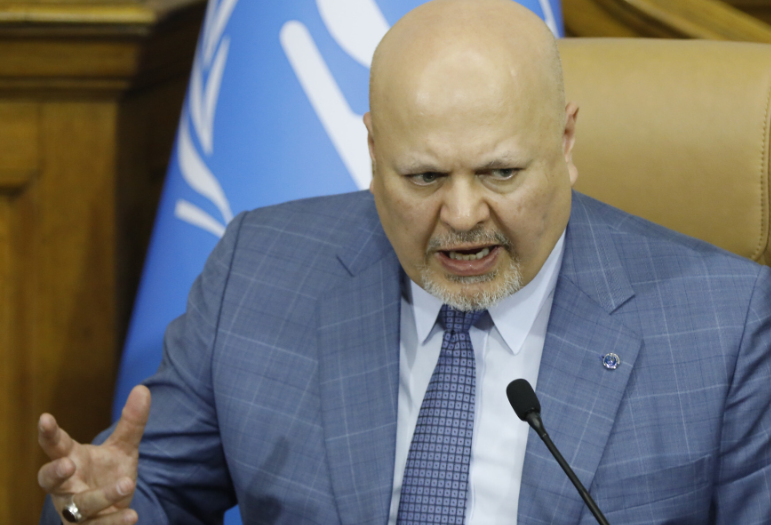In a bold move, the International Criminal Court (ICC) chief prosecutor, Karim Khan, has issued arrest warrants for Israeli leaders, including Prime Minister Benjamin Netanyahu and former defense minister Yoav Gallant. According to a senior Western diplomat with firsthand knowledge of the case, this decision is part of Khan’s larger strategy to sway Western nations’ support for Israel.
The Strategy Behind the ICC’s Move
The ICC’s recent action against Israeli leaders has been met with mixed reactions globally, but behind the warrants lies a calculated effort by Karim Khan to influence the diplomatic landscape. According to a Western diplomat who spoke on the condition of anonymity, the prosecutor’s intention was not just to target Netanyahu and Gallant for their alleged roles in war crimes. Instead, Khan’s broader goal appears to be to create a ripple effect in international relations, particularly among Western nations that have traditionally been supportive of Israel.
The diplomat recalled a conversation with Khan from last year, where the prosecutor seemingly laid out his rationale for pursuing the warrants. “You just wait and see. If I apply for warrants against Netanyahu, this would give countries like Germany and Canada the excuse they need to turn against the Israeli government,” Khan allegedly said. The sentiment expressed by Khan, if accurate, suggests a strategic use of legal measures to drive a wedge between Israel and its Western allies, particularly at a time when global tensions surrounding the Israeli-Palestinian conflict are at their height.
The Western Dilemma: Torn Between Alliances and International Law
For many Western nations, Israel has been a long-time ally, with strong political, military, and economic ties. However, the growing international discourse surrounding human rights, particularly with the ongoing violence in Gaza, has created significant pressure for these nations to reconsider their positions. The ICC’s arrest warrants against Netanyahu and Gallant may well serve as a catalyst for more critical scrutiny of Israel’s actions in international forums.

Countries like Germany and Canada have traditionally been staunch supporters of Israel. However, the diplomat’s comments suggest that the ICC’s move could serve as the impetus for these nations to reconsider their stance on Israel, potentially shifting from staunch defenders to more vocal critics.
This shift is not without precedent. As public sentiment in Europe, North America, and elsewhere has increasingly tilted in favor of Palestinian rights, governments may feel compelled to adjust their foreign policies in line with domestic public opinion, especially with the growing power of pro-Palestinian activist groups. If the West starts to turn against Israel in a more formal, political sense, it could have significant consequences for the Middle East’s geopolitical landscape.
The Impact on Netanyahu and Israeli Politics
For Israeli Prime Minister Netanyahu, the ICC warrants could complicate his already fragile political standing. Israel has consistently refused to recognize the ICC’s jurisdiction, dismissing the court as biased and politically motivated. Netanyahu has also made it clear that he intends to fight the warrants with all available legal means, stating that Israel would never submit to foreign courts.
But while Netanyahu’s defiance may play well with his domestic base, the international repercussions could be more complicated. The ICC’s actions add a layer of international legal complexity that could shape Israel’s diplomatic relations in the years to come. If Western governments, influenced by the ICC’s charges, start to publicly criticize Israel’s government, it could put Netanyahu in an uncomfortable position, especially as he tries to balance his national security policies with international diplomacy.
Pro-Palestinian Groups and Public Pressure
The ICC’s decision to issue arrest warrants is also likely to embolden pro-Palestinian activists who have long called for accountability for Israel’s actions in Gaza and the West Bank. Over the past several years, public opinion in many Western nations has shifted in favor of Palestinian rights, especially as images and reports from Gaza have sparked outrage globally. The warrants against Netanyahu and Gallant may be seen as a victory by pro-Palestinian groups, but they could also escalate calls for governments to take stronger action against Israel.
For these activists, the warrants represent a step toward holding Israeli officials accountable for alleged war crimes, something they’ve advocated for at international institutions for years. While these groups have been vocal, their ability to influence Western governments in concrete ways remains a key question. If the ICC’s actions continue to make headlines, it could increase pressure on pro-Israel politicians in the West to rethink their support, particularly in countries with growing pro-Palestinian sentiment.
What’s Next for Israel?
As Israel grapples with these legal challenges, the key question is how its leadership will respond. Netanyahu has already indicated his intention to resist the ICC’s demands, both legally and diplomatically. However, as the case progresses, the political and diplomatic landscape surrounding Israel could shift significantly.
The international community will likely be watching closely as the situation unfolds, particularly to see whether the ICC’s legal moves inspire a larger shift in Western public opinion and government policy. If so, Israel’s alliances, especially with key European and North American countries, could become strained.
While Netanyahu may enjoy strong domestic support, especially among those who view the ICC as a politically motivated institution, the international ramifications of these warrants could present significant diplomatic challenges moving forward. If Western governments follow through on the pressure from activist groups and international institutions, Israel’s diplomatic position could become increasingly tenuous in the years ahead.
